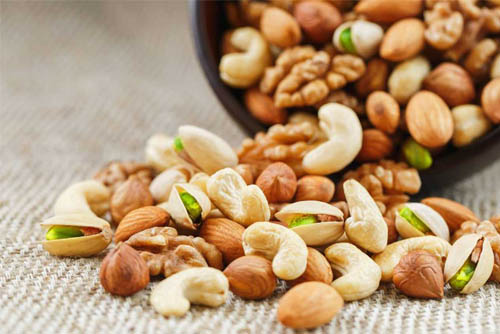dried fruit:
Dried fruit or in other words dry fruit refers to the kernels of edible seeds and fruits that have been dried under a special process and in the old days they were called dried fruit or kernels, of course, dried fruit and nuts are two completely different food groups.
Definition of nuts:
Nuts are a mixture of dried fruits, the composition of which varies according to people's tastes. The presence of nuts in some traditional Iranian ceremonies is actually a kind of meaning given to them, ceremonies such as ancient Nowruz and Yalda nights, which have a very ancient history in the ancient and traditional culture of Aryans.
Nuts have even opened their feet in the spiritual concepts of women's gatherings, and that is the use of some kind of nuts in some of these ceremonies, which, of course, has no legal basis and is not confirmed by any of the Islamic scholars in all types of differences.
In the economy, nuts have easily established a foothold and allocating a major share of non-oil exports to this popular product has contributed significantly to the country's foreign exchange.
Naming nuts
The naming of nuts follows two general rules:
-
Naming nuts based on their use, such as Yalda nuts and problem-solving nuts -
Naming nuts based on the compounds used in them, such as salted nuts, sweet nuts, and four-corned nuts
fruit nuts
The nut family is a group of dried fruits that come from trees with open and unopened seeds and are considered a vital resource for humans and animals.
Nuts and nuts:
Of course, nuts include a wide variety of fruits and their kernels, but the main constituents of nuts are:
Pistachios, hazelnuts, peanuts, tree almonds, cashews, walnuts, soybeans, raisins, raisins, chickpeas, pumpkin seeds, sunflower seeds, Japanese seeds, and other varieties
Nutritional value and benefits of nuts and dried fruits:
All legumes are edible seeds and dried fruits with high nutritional value, and most of the athletes consume these products daily in their diet, so you can learn about the nutritional value of some of these products.
Nutritional value and benefits of peanuts:
Due to having more nutrients and protein, peanuts are very important and practical as a healthy food supplement for people who do all kinds of sports to keep fit.
It is interesting that in the classification of food, peanuts are known as legumes, but most people look at them in the category of nuts.
According to the information published by the United States Department of Agriculture (USDA), each hundred grams of peanuts have 567 grams of calories and nutrients including protein, fat, carbohydrates, fiber and sugar, as well as 1345.58 mg of mineral salts including calcium. , iron, magnesium, phosphorus and potassium.
Nutritional value and benefits of tree almonds
Although tree almonds have less protein than peanuts, they are superior in other foods.
According to the information published by the United States Department of Agriculture (USDA), each hundred grams of tree almonds have 579 calories and nutrients including protein, fat, carbohydrates, fiber and sugar, as well as 1782.34 mg of mineral salts including calcium. iron, magnesium, phosphorus, potassium and vitamin E.
Nutritional value and benefits of walnuts
Walnut kernels are consumed raw and do not have any processing.
Walnut kernels can be eaten alone, with meals (cheese, fesanjan, eggplant curd, etc.).
There are large amounts of manganese and copper in walnuts, as well as some zinc, iron, calcium, selenium and a very small amount of sodium. The presence of vitamins B1, B5, and B6 in large quantities, and vitamin E, B2, and B3 in smaller quantities, as well as 7.6 grams of fiber, have increased the calories of this valuable edible brain, so it is better to consume walnuts on the day you want to consume them. Calculate it and subtract it from your daily calories.





